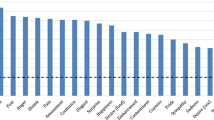Abstract
According to cognitivism about emotion, (all) emotions are reducible to some (combinations of) non-emotional states. In one version, they are reducible entirely to cognitive states, such as beliefs or judgments; in another, they are reducible to combinations of cognitive and conative states, such as desire or intention. Cognitivism is plausibly regarded as the orthodoxy in the philosophy of emotion since the 1980s. In a recent paper, however, Montague develops a powerful argument against cognitivism. Here I argue that the argument nonetheless fails.
Similar content being viewed by others
Notes
Such fulfilled wishes (wishes for what had in fact taken place) are much harder to notice introspectively than frustrated wishes (wishes about what had not taken place), but arguably they are there all the same.
This distinction pertains to what we may call ‘transitive happiness,’ the kind of happiness reported by a transitive verb. There is also what we might call ‘intransitive happiness,’ reported by the corresponding intransitive verb. It is an open question what the relationship between the two might be. One view is that ‘S is happy’ just means ‘S is happy about S’s life/existence.’ This would analyze intransitive happiness in terms of transitive happiness. Another view, however, would reject any such analysis.
For useful comments on a previous draft, I am grateful to an anonymous referee for Philosophical Studies. Work on this paper was supported by the French National Research Agency’s grants ANR-10-LABX-0087 IEC and ANR-10-IDEX-0001-02 PSL*.
References
Bennett, J. (1988). Events and their names. Oxford: Oxford University Press.
Gordon, R. (1987). The structure of emotion. Cambridge: Cambridge University Press.
Marks, J. (1982). A theory of emotion. Philosophical Studies, 42, 227–242.
Montague, M. (2009). The logic, intentionality, and phenomenology of emotion. Philosophical Studies, 145, 171–192.
Nussbaum, M. (2001). Upheavals of thought: The intelligence of emotions. Cambridge: Cambridge University Press.
Solomon, R. (1976). The passions. New York: Doubleday.
Vendler, Z. (1967). ‘Facts and events.’ In his linguistics in philosophy. Ithaca: Cornell University Press.
Author information
Authors and Affiliations
Corresponding author
Rights and permissions
About this article
Cite this article
Kriegel, U. Cognitivism about emotion and the alleged hyperopacity of emotional content. Philos Stud 173, 315–320 (2016). https://doi.org/10.1007/s11098-015-0493-2
Published:
Issue Date:
DOI: https://doi.org/10.1007/s11098-015-0493-2



